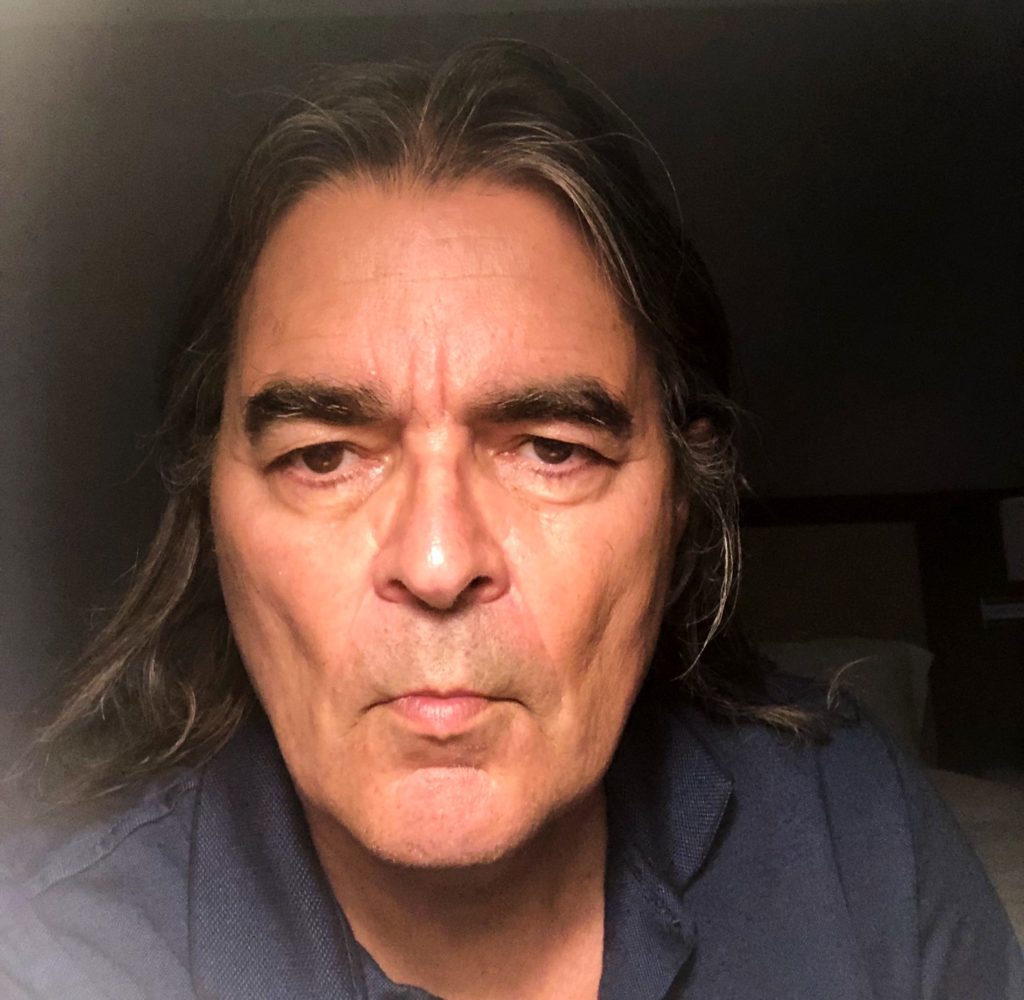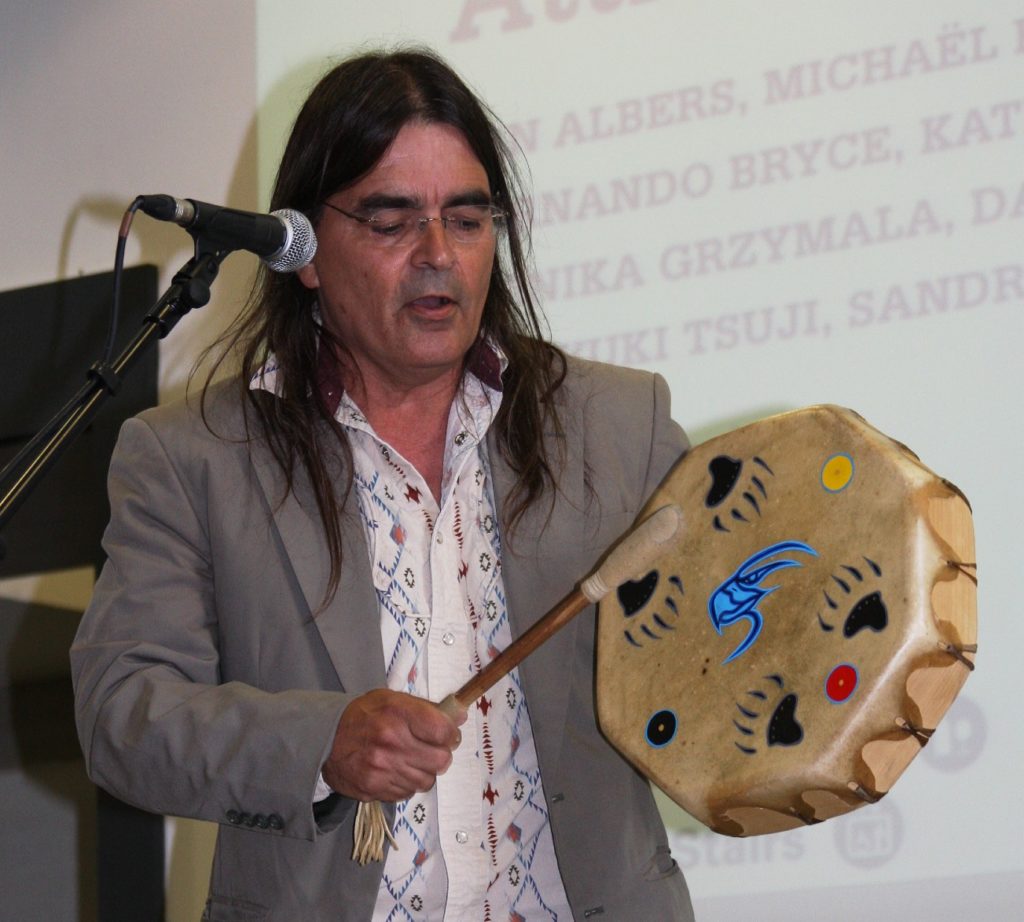An enrolled citizen/member of the White Earth Anishinaabe Nation, Gordon Henry has dedicated his writing, scholarship, and life to Indigenous tribal communities. In recognition of this work, he has been appointed the inaugural Audrey and John Leslie Endowed Chair in North American Indian and Indigenous Literary Studies at Michigan State University.
“Most everything associated with the Audrey and John Leslie Endowed Chair in North American Indian and Indigenous Literary Studies position speaks to the work I’ve done in the past and the work I hope to do in the future,” Henry said. “I also wanted to take this position as a way of foregrounding its future. I hope to set a precedent by having the position filled by a tribally connected writer, scholar, and community-centered tribal citizen.”
Henry is a Professor of 20th Century and Contemporary Literature, Creative Writing, and Native American Literature in Michigan State University’s Department of English. The main purpose of his new position as the Audrey and John Leslie Endowed Chair in North American Indian and Indigenous Literary Studies is to promote the transformative potential of literature.

“I will strive to bring more awareness of political, cultural, and intellectual issues relevant to contemporary Native people and communities,” he said. “And I will work to celebrate the art and work of American Indian writers, scholars, and community members through programming initiatives and through Leslie-supported events on campus and off campus in tribal communities.”
An internationally recognized writer, Henry’s creative work focuses on American Indian survival, adaptability, and the breadth and depth of American Indian storied intellectual resilience. Having lived and worked in tribal communities, he understands the United States’ troubled historical legacy and the ongoing injustice, cultural trauma, and epistemological violence aimed at American Indian people. His writing and scholarship offer readers different Indigenous ways of relating to American history, in its various machinations of denial, and in political, economic, and violent interference in the lives of tribal people.
“Dr. Henry is a field leader in North American Indian studies whose creative, scholarly, and editorial practices are holistically interconnected,” said Justus Nieland, Chairperson of MSU’s Department of English. “His record of successful publication and his intellectual leadership are impressive and visionary. He is both a globally recognized scholar of North American Indian literature as well as a talented and award-winning writer whose creative work spans fiction, poetry, and creative non-fiction.”
I will strive to bring more awareness of political, cultural, and intellectual issues relevant to contemporary Native people and communities. And I will work to celebrate the art and work of American Indian writers, scholars, and community members.”
Professor Gordon Henry
Henry’s poetry, fiction, and essays have been and continue to be taught in American Indian literature courses throughout the United States and can be found in various collections of American Indian literature in the United States and Europe. His poetry and short fiction also are published in international journals in Hungary, Italy, and Cuba, and one of his multi-genre works, The Failure of Charms, was translated into Catalan. Another of his multi-genre novels, The Light People, which consists of a series of stories about a tribal community in Northern Minnesota, received an American Book Award in 1995.
As the Senior Editor of the American Indian Studies book series published by the Michigan State University Press, a position he has held since 2005, Henry has published two volumes a year, and more than 20 to date. In 2012, he founded Indigistory, a community-based digital storytelling project that is dedicated to tribal communities. For that work, he received the Distinguished Partnership Award for Community-Engaged Creative Activity from MSU in 2018.
“Dr. Henry’s vitae documents his exceptional scholarly record in Literary and Native American Studies as well as his exemplary level of service to and recognition by Michigan State University, by the international literary community, and by the tribal communities he serves,” said Gwen Westerman, Professor of English at Minnesota State University and Director of the Native American Literature Symposium. “His work examines practically every aspect of contemporary and historic American Indian modes of storytelling and the issues of decolonization, resistance, and survival presented in those genres. He is widely known in our field, and more importantly, widely respected as a generous, multitalented, and honest human being.”

Henry’s professional interests in creative writing, teaching, and community engagement grew organically from family relations and history. He has worked internationally across university units and in tribal communities to develop programs, projects, and events. As recently as November 2020, he organized a virtual workshop to celebrate the historical significance of When the Light of the World Was Subdued, Our Songs Came Through: A Norton Anthology of Native Nations Poetry, which is the first historically comprehensive Native poetry anthology, containing the work of more than 160 poets and spanning approximately 100 Indigenous nations. Henry is a featured poet and Regional Advisor for the Midwest and Northeast sections of the anthology.
“I believe that everything I do and will continue to do in the university and beyond will center on engagement with American Indian communities, people of color, underrepresented people, and underserved communities,” he said, “whether that engagement involves my work in an institutional or scholarly capacity, or whether it’s what I do as part of who I am in my life as an Anishinaabe.”
Henry, along with George Cornell, Emeritus Professor of English, and Patrick Lebeau, Professor of Writing, Rhetoric, and American Cultures, drafted the original program documents and was granted approval and funding for the establishment of the American Indian Studies (AIS) Program at MSU. Henry also served for three years as Director of the Native American Institute, working with tribal communities and university partners on sustainability issues, Indigenous food sovereignty, early childhood education programs, and a youth suicide prevention film project. And, he aided in the development of the Saginaw Chippewa Tribal College on the Isabella Reservation in Mount Pleasant, Michigan.
Dr. Henry’s impressive accomplishments as a teacher, scholar, writer, and editor are all the more striking when we consider his career-long work as an activist, teacher, and spiritual leader within tribal communities.
Justus Nieland, Department of English Chairperson
More recently, Henry worked on The Andrew W. Mellon Foundation grant received by the College of Arts & Letters that is dedicated to the development of community and academic programs, curriculum, and resources for teaching Anishinaabemowin and other less commonly taught languages. He serves as a co-PI, in partnership with the Saginaw Chippewa Tribe’s Ziibiwing Center, on a strategic planning grant for creating a digital archive of Anishinaabe literature, language, and storytelling.
“I expect that work to continue to evolve as I continue to do the work I’ve done to date. I have dedicated most of my life to maintaining a connection to tribal ceremonies, to culturally specific ways of knowing associated with that ceremonial life,” Henry said. “I believe resources afforded by the Audrey and John Leslie Endowed Chair in North American Indian and Indigenous Literary Studies will support my efforts in enhanced awareness of contemporary Native people and to celebrate the culturally important work of American Indian people. I also hope the position will support my efforts to be a helper to students, community members, and faculty.”
In 2019 and 2018, Henry held the prestigious appointment as the Gordon Russell Visiting Professor of Native American Studies at Dartmouth College. During that same time, he also served as a Board Member on the Saginaw Chippewa Tribal College Board of Regents.
“Dr. Henry’s impressive accomplishments as a teacher, scholar, writer, and editor are all the more striking when we consider his career-long work as an activist, teacher, and spiritual leader within tribal communities — work that began when he was in graduate school, with the White Earth Reservation, and has continued through his remarkable accomplishments in community outreach and engagement at MSU,” Nieland said.
Prior to coming to MSU in 1993, Henry was an Assistant Professor of English at Ferris State University. He has a Ph.D. in English and Creative Writing from the University of North Dakota, an M.A. in English and Creative Writing from Michigan State University, and a B.S. in Business Management from the University of Wisconsin-Parkside.


